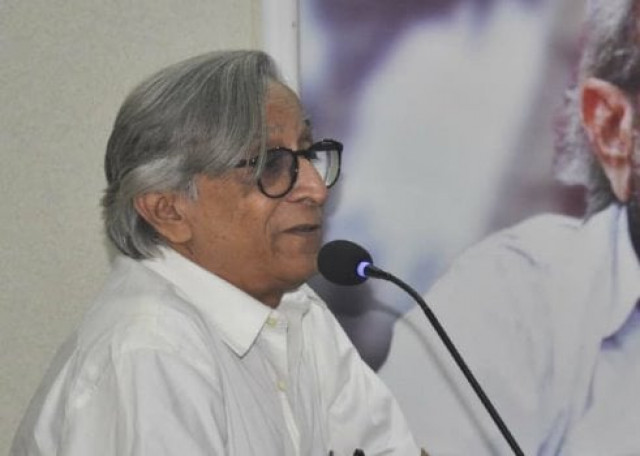Wise men, golden moments
A tribute to Abul Hasanat Sahab, who passed away on Saturday

Abul Hasnat Sahab (Late) PHOTO: FILE
With his death, Pakistan has lost a voice of reason. One that was concerned with the direction journalism has taken. His tweets illustrated his disgust at present-day media practices. And he was not one to mince words. At a time when the difference between right and wrong has been blurred, he was one of the few who stood up to remind us where we were erring.
I first met him when he was city editor of Daily Dawn — a paper I had joined as leader writer. He had the reputation of being abrupt and dismissive. I largely steered clear.
My first meeting didn’t go well. I had written a piece on the Tasman Spirit, a Greek-registered oil tanker which in 2003 ran aground off Karachi. I was upset that the paper wasn’t covering the story as extensively as it should so I wrote a piece and gave it to my editor, the legendary Ahmad Ali Khan. He, in turn, told me to go and give it to Hasanat Sahab myself.
I went into the city editor’s office. He looked up and told me to leave it on the table and then turned around and resumed working on his computer. I had been summarily dismissed. The piece was published the next day, but the message was clear: he was not having someone bring him pieces with the editor’s recommendation.
To be fair, the work of a city editor at Dawn was very challenging. It was about taking decisions and managing a team of largely senior reporters who did not always listen. It would sometimes be a battle of wills. Hasanat Sahab had to be on top of his game to be able to lead. And he did that very ably till 2010 when he left Dawn after fifteen years of service and joined The Express Tribune.
Away from the pressures of producing the city pages, in his role as an editorial consultant, he would monitor events and give his valuable input to both the desk as well as the reporters. He adapted well to this change.
Thanks to my friend Shahzad Sharjeel who suggested we meet him, to Mahim Mahir the city editor in Karachi who agreed to do so, we got Hasanat Sahab on board to help with improving the quality of reporting.
Time and again he would give his opinion, offer advice, suggest changes and, of course, berate us when he thought we were going off course. When work relations with Mahim or others on the city pages would get tense, it was Hasanat Sahab who would step in to soothe ruffled feathers. He was one that many would go to for advice on their professional (and sometimes personal) predicaments.
Our relations improved. He would call me “Sahab” which, for me, was awkward given how senior he was to me. But when I protested to this, he said it was his duty to give respect to the position of the editor. Everything had to be done properly. Hasanat Sahab was very particular about being proper.
By far he was the best-dressed member on staff. But his real contribution I believe was in mentoring younger journalists. He would be gentle at times, a tyrant at others. They loved it. He was also active at the press club and many an evening would end up there to meet former colleagues and his numerous admirers.
Possibly what pained him most – though he never said it, was the lack of reading habits amongst younger journalists. He also had a literary bent of mind – quoting poetry, urging us to read something or another. We miss all that.
Reporter Rabia Ali quoted a poem she says he loved and I reproduce: “Do not go gentle into that good night/old age should burn rave at close of day/rage, rage against the dying of the light/though wise men at their end know dark is right.”
We will miss you Hasanat Sahab. And when we meet next, I’m sure you will have something to say about this piece. Till then, goodbye.
Published in The Express Tribune, October 7th, 2019.
Like Opinion & Editorial on Facebook, follow @ETOpEd on Twitter to receive all updates on all our daily pieces.















COMMENTS
Comments are moderated and generally will be posted if they are on-topic and not abusive.
For more information, please see our Comments FAQ